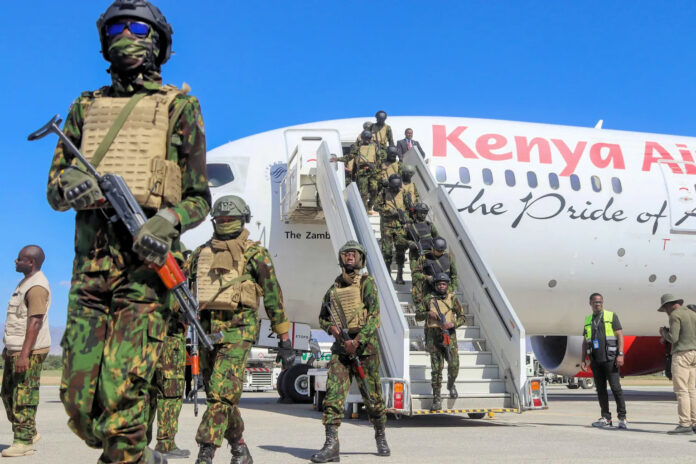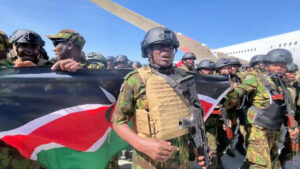
(Français)
On the morning of Sat., Jan. 18, 2025, a Kenya Airways jet landed in Port-au-Prince carrying another 218 Kenyan police officers, among them a five-member all-women SWAT team.
This latest deployment, following the arrival two weeks ago of 158 Salvadoran and Guatemalan troops, now brings the Washington-sponsored Multinational Security Support Mission (MSS) in Haiti to a strength of 790 troops, still less than one third of the 2,500 envisioned when the force was approved in October 2023.
Nonetheless, Kenya claims it will send another 200 officers by the end of January and then 200 more in February as well.
As usual, the new arrivals were greeted on the tarmac of the capital’s Toussaint Louverture International Airport by a host of dignitaries responsible for inviting them, including, this time, Transitional Presidential Council (TPC) representative Fritz Alphonse Jean (who will become the body’s president in March), Prime Minister Alix Didier Fils-Aimé, Haitian National Police (PNH) chief Rameau Normil, the MMS chief, Kenyan Gen. Godfrey Otunge, U.S. Ambassador Dennis B. Hankins, and Canadian Ambassador André François Giroux.
“The arrival of these reinforcements marks a crucial step in freeing our country from the grip of criminal networks and restoring peace here,” said Fils-Aimé in a speech for the occasion.
Despite the troops trickling into Haiti, the MSS remains a force with an uncertain future, particularly with President Donald Trump’s arrival in the White House on Jan. 20. In his inaugural address, he reiterated his “America first” agenda, which includes, he has said, curbing the spending of U.S. taxpayer dollars abroad for military adventures.
As the following article (first published Jan. 6) elucidates, Kenya and the MSS are already are challenged in financing, morale, and effectiveness. Things could become even worse under Trump.
Kim Ives
Kenya’s peacekeeping mission controversially deployed to Haiti in June 2024 seems to be hopping from one challenge to another after surviving the initial legal and logistical challenges, the latest being both operational and remuneration, where the officers reportedly have not been paid their dues since September.
On the ground, this UN mission, which was set up in October 2023 and which Kenya agreed to lead in order to restore its image, is faced with an explosive situation.
The mission is supposed to be helping the Haitian police to “restore basic security and State control. ” But this is far from being the case. The dozen or so violent gangs that de facto run the country and control 85 % of the capital, Port-au-Prince, are steadily gaining ground.
The reports of non-payment of their salaries and allowances come amid claims that at least 20 police officers from the 425-strong Kenyan policemen serving under the UN-backed mission to stabilize the lawless Caribbean country have opted to resign from the force in frustration.
The officers allegedly wrote letters to the UN in November offering to resign from their duties, citing frustrations over non-payment of three months’ salaries and allowances, reports which have been denied by the MSS and the Kenya police authorities.
According to the Reuters news agency, the officers began to submit resignation letters in October after allegedly trying to resign verbally and being told to put their requests in writing. While three officers submitted resignation letters in October, another 15, among them senior commanders, did so in November, said the agency, citing the aggrieved officers.
“The reports that officers have offered to resign from the MSS are not accurate, all our police officers serving in Haiti have been paid up to the end October,” said police Inspector General Douglas Kanja. This contradicted a similar denial by the MSS, which said that the officers had been paid up to September, in what is turning out to be a financially crippled mission.
A poorly thought-out expedition
The allegations were further denied by the MSS force commander Daniel Otunge, who termed them as “malicious and inaccurate” even as reports of dissatisfaction and disaffection kept surfacing back home in social media platforms.
“Things haven’t gone as well as we expected. We never received our salaries and allowances on time, and conditions in our camp are bad because we lack basic necessities, including food,” said John, an MSS officer interviewed by Afrique XXI, who requested anonymity. According to David, another officer contacted by Afrique XXI, the MSS members have not been equipped with the sophisticated weapons they were promised. “Things are not going well, morale is low and, as a result, people don’t want to risk their lives confronting criminals,” he said, also on condition of anonymity.

But even as denials came, reports indicate that the financial challenges have been brought about by a lack of financial commitment from the mission’s main financier, the United States, and other Western powers, which are supposed to fund the MSS via voluntary contributions.
It has been further complicated by claims of a shortage of munitions and equipment needed to confront more than a dozen gangs that run the country, a mission that Kenya had hoped would run smoothly and boost the country’s international image and standing, according to Nairobi human rights lawyer Soyinka Lempaa.
For Lempaa, these difficulties are the result of a poorly thought-out expedition by Kenya. “The problem is that Kenya volunteered to lead the mission to Haiti so as to be in good books with Western powers and in an attempt to shore-up its international standing and esteem,” he told further Afrique XXI. “The mission has also all along lacked the goodwill of the same powers, meaning that the country is left to undertake a very difficult law and order restoration task, virtually on its own.”
The result is also that Kenya is delaying the deployment of an additional 600 policemen as part of the pledged 1000-strong force as earlier planned, with the officers stuck at a training garrison in Nairobi since the beginning of November when they graduated from training, ready for deployment.
Lack of liquidity
Not unexpectedly, the MSS is having problems fighting the gangs controlling large parts of Port-au-Prince, and its suburbs, where more than 3,600 people have been killed in 2024.
Part of the problem with the mission, according to Human Rights Watch, is that while it was approved by the UN security Council, it is not a UN operation and wholly relies on voluntary financial contributions. So far only a paltry US$ 85 million of the mission’s estimated US$ 600 million required annually to support its operation has been received through a trust fund established by the UN.
“Despite some good will and commitments, the government, the MSS, and humanitarian and human rights groups working in Haiti don’t have anywhere near the resources needed to effectively address the challenges,” said HRW’s Nathalye Cotrino and Ida Sawyer.
In early January, the MSS only had 425 Kenyan policemen of the 2,500 personnel expected on the ground in Haiti. It was operating on around US$454 million, which was made up of direct contributions of $369 million from the United States to complement the UN-controlled Trust Fund’s collection of US$85 million.

Despite this shortfall, the UN Security Council in September unanimously voted to extend the MSS’s mandate for another year, while rejecting calls from the U.S. and Haiti to transform it into a UN “peacekeeping” operation (UNPKO).
The denials of resignation threats by officers aside , Kenya’s President William Ruto in October appealed for urgent financial support from the “international community” when meeting in Nairobi with Haiti’s then Prime Minister Garry Conille .
“We are asking the international community to match their commitment and their pledges with the necessary action for us to be able to undertake the task ahead of us,” Kenya’s President pleaded.
Kenya had promised to deploy a total of 1,000 police officers, but only has enough cash to run operations up to March 2025, but even this schedule is now in doubt, if the protests by the officers are anything to by and if the claims that Kenya, a country running on budget deficit, continues footing the bill.
“A costly political mistake”
It is a claim that has been lent credence by National Treasury and Economic Planning Minister John Mbadi, who in November admitted that “this money we are spending on behalf of the UN, we are the ones making the payment so the money comes from our exchequer because these are our officers.” It also lends credence to claims that the country has spent no less than US$15 million of its own money as it awaits reimbursement of cash from the UN.
Haiti’s powerful gangs are digging trenches, using drones, and stockpiling weapons as they change tactics to confront the Kenyan-led police force deployed to wrestle back government control, a UN report said on Jan. 1. On the other hand, frustrations with salaries for the Kenyan officers who took up their roles in June is nothing new. The policemen had gone without pay for the first two months of their deployment, in what was the troubled mission’s rocky start. The MSS, in an Aug. 25 statement, acknowledged the delayed payments, assuring that “there was nothing to worry about with regard to welfare issues of the MSS officers.” But challenges for the deployment, which remains deeply unpopular back in home in Kenya, have evidently persisted.
Overall, the participation of Kenya as leader for the supposed 2500-strong force remains a “costly political mistake” for President Ruto, according to James Mwangi, head of the African Center for Corrective and Preventive Action (ACCPA) in Nairobi. “The president is leading Kenya into a dangerous mission abroad by agreeing to be used by the United States and France to pacify Haiti, a country thousands of kilometers away from home, where Kenya has no known political or economic interest,” he told Afrique XXI.
It is perhaps because of this realization that Ruto on Dec. 20 appointed a consul-general to Port-au-Prince, the first time Kenya has established diplomatic ties with the country. Ruto picked former senior policeman Noor Gabow to head the consulate and provide support to the expedition.
Maina Waruru is a Kenya-based freelance journalist who works for The Pie News and University World News, among others. The original version of this article was published in Afrique XXI.










[…] Having failed to convince China and Russia to convert the MSS into a genuine UN “peace-keeping” operation, UN Secretary General Antonio Guterres gave up on sending “blue helmets” to Haiti and is settling instead for continuation of the anemic MSS. […]
[…] Having failed to convince China and Russia to convert the MSS into a genuine UN “peace-keeping” operation, UN Secretary General Antonio Guterres gave up on sending “blue helmets” to Haiti and is settling instead for continuation of the anemic MSS. […]
[…] a “peace-keeping” force (as it did in the Dominican Republic in 1965) to Haiti, given the disastrous performance of the Washington-financed Multinational Security Support mission (MSS), led by […]